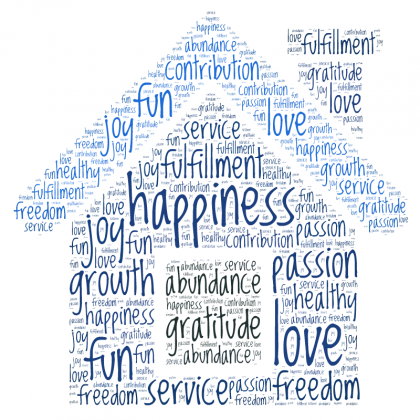“Most people are as happy as they make their minds up to be”–Abraham Lincoln.
Every year it seems that hurricanes and tornados hit the same spots, damage the same people’s homes, and occur almost like clockwork every couple of years. While it is always sad to see people lose everything, I always wonder “Why wouldn’t they just move?”. The same could be said for why I still live in NY with a giant crime rate, ridiculous taxes, and politicians that do not reflect my values. For me, the answer is, (as I guess the answer for the people subject to natural disasters would be) “because it is home”. I do not have a good logical answer other than familiarity, friends, family, and attachment.
We have familiarity and attachment to our “emotional homes” as well. This is the place we go to emotionally when we are triggered by external events. It is critical to understand that we have an emotional home and what that emotional home is. The quality of your life is directly a result of the quality of your emotions. More than any other factor, this determines where you are in life.
If you are happily married with wonderful children but are worried and anxious, you have a worried and anxious life. If you are a rock star at work or on the field but still feel inadequate or unfulfilled, you have an insecure life. If you have the biggest house and the fastest cars but are filled with frustration and anger, you aren’t rich—you are angry and poor.
My emotional home for most of my life was anger. For some, it is guilt, shame, or fear. I would respond to being hurt with anger. No matter what the trigger was, my default was anger. I experienced other emotions as well, but they normally came after anger. Sometimes this reaction or feeling doesn’t even make sense (like living in a Tornado zone). Dog gets hit by a car? Anger. Got caught doing something wrong? Anger, again. Break up? Anger. Even when my kids would get hurt, my first emotion was anger. Seeing this emotional pattern was a big step because not only am I now able to control it better I can see it coming and recognize that this isn’t an intelligent or thoughtful reaction…just my lizard brain running to my emotional home.
Identifying your emotional patterns or “home” is paramount to knowing yourself and the first step in being able to gain power over what is suppressing your potential!
If you focus on the positive you are going to feel confident and good. (easy, right?) If you focus on the negative you are going to feel scared and insecure. (makes sense) Changing your focus can change your mindset. Whether your focus is true or not, isn’t as important. What we focus on creates our feelings. Your energy goes where your focus goes and your brain and body can be maneuvered with your focus. So while you might not be able to choose how you feel in any given moment, you can choose your focus, and in doing so can manipulate your brain to feel differently.
For example, when you encounter someone else, and they criticize your actions in some way, you can take that as an insult, tough love, or coaching, and the meaning you assign to that will contribute to your emotional state regarding the trigger. I recognize that people will criticize you with the intention of insulting you, but if we choose to see it a different way, we are in control of our feelings and actions, not someone else.
If you were to consider your trial as a punishment or your friend’s critique as an insult, you can see how much differently you would react to that, as opposed to seeing it as a challenge or tough love. The same trigger, but with a different outlook, would provoke different actions. Which do you think would be most beneficial to you? Which do you think would put more power at your disposal? Can you see how the current meanings you assign to your emotions could make you less powerful?
Consider this: You are waiting at a table in a crowded restaurant by yourself for a friend. You agreed to meet at 6 pm and it is 6:30 and he/she is not there. No call, no text.
How do you feel? One person would feel anger (guess who?) Another might feel some level of social anxiety. A third could feel fear for what might have happened to their friend.
3 different responses to the same catalyst are only dictated by the meaning they put on the absence of their friend. Consider how these people will act when that friend walks in at 6:45, all because of the meaning they place on the catalyst. The angry person would most likely project their rage onto the late guest, while the scared person would be relieved that their friend arrived safely. Again, different actions in the same situation.
We have the ability to choose and change our emotional homes. At the very least, acknowledging your’s will allow you the power of seeing it coming, and hopefully re-evaluate it at that time. ” I feel my emotional home calling me, let me take another look at the problem” You can choose to shift from negative emotional states such as anger, anxiety, and fear to ones of love, gratitude, and bravery. You do have a choice, and if you can learn to control and direct your emotions, you can live a more successful and happier life!


